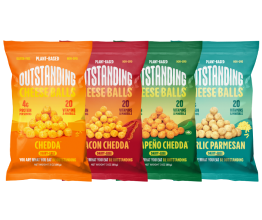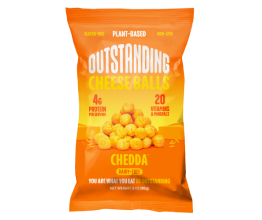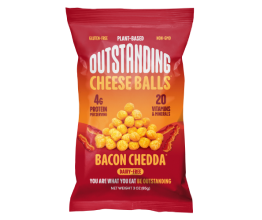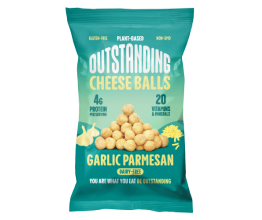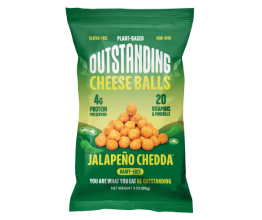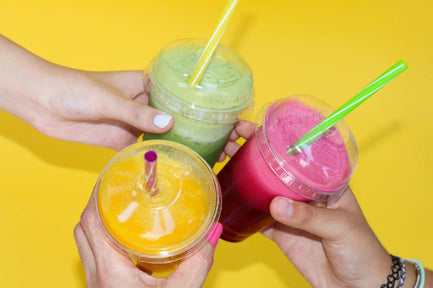Pork Rinds vs Chips: Which is Healthier?
You’re going about your day as usual, when suddenly you desperately need a crunchy Cheeto, and stat. We all relate to the feeling, and more often than not, a bag of crispy, crunchy, fried-in-oil goodness is the only thing that will scratch the itch.
But before you reach for that bag of crunchy deliciousness, you might want to think about the quality of the nutrition you’re getting from that snack – or if there’s any legitimate nutrition at all. (Okay, we both know there’s not).
Since chips tend to be lacking in the health department, more people are turning to pork rinds as a tasty, more nutrient-dense alternative that still gives you that yummy-as-heck crunch. Pork rinds check many of the same boxes in terms of texture, taste, and overall satisfaction, making them a popular pick in recent years.
Let’s take a closer look at the health profiles of both chips (all different kinds) and pork rinds, examining the differences and seeing which one is truly the healthier option.
If you’re someone who can’t live without that signature salty crunch, this is the article you need to read, especially if health is a top priority. Let’s see how you can savor the flavor without feeling like a junk food monster.
Types of Chips and Their Nutrition
When you think of chips, what exactly do you picture? We all have our own favorite brand that we indulge in from time to time, and each product has a unique set of pros and cons from a health standpoint.
Let’s go over a few of the best-known chips and lay down some real talk.
Standard Potato Chips
The super-thin, melt-in-your-mouth feel of a classic potato chip is something we can all appreciate, and these are still the top-selling chips in the world for obvious reasons.
We all know that these are not healthy snacks by any stretch, and the companies that produce these products aren’t making any claims to the contrary. That hasn’t stopped us yet, but still.
Flip over a bag of classic potato chips and you’ll be instantly disappointed in the lack of nutritional content, the high amount of carbohydrates, plus a series of red flags that we should all be able to recognize. High in calories, low in protein, and the “bad” types of fat derived from hydrogenated vegetable oils that we definitely don’t want to consume.
Enjoy a handful of classic potato chips once in a very blue moon, but beyond that, you’ll want to keep them on the shelf.
Junky Flavored Chips
Could there be an even unhealthier product than the chips we just described? Don’t underestimate the junk food industry – it always finds a way to outdo itself in the worst way!
We’re talking about the chips covered in mysterious flavored powders that catch your eye in the aisles—and they are so good even though you have no idea what’s in there.
It’s not just the lack of nutritional content that makes these chips a liability to your health – it’s also all the unusual, unnatural colors and flavors that go into the final product.
Once again, you’re probably better off skipping these funky-flavored chips for the most part, although we realize that sometimes you might not be able to resist their pizza-flavored temptation.
Baked Chips – Are they Better?
The worst culprits are out of the way, right? Baked versions of our favorite brand-name chips are healthier, right? It says so right on the label, and why would multi-billion dollar companies lie about something like that? Oh, wait.
Yes, these baked chips might be lower in fat, so that’s a small win, but here’s the devious thing about these products – they don’t fill you up, so you end up eating more than you otherwise would!
That’s why you always want a bit of healthy fat in your snacks, to signal satiety to your brain and prevent a total overload.
Tortilla Chips – Corn vs. Flour
We all know intuitively that most chips are downright unhealthy, but what about tortilla chips made from flour and corn? At least the ingredients are somewhat recognizable, and we can trace the production process without needing a chemistry degree.
There really are some healthy brands of tortilla chips out there, but most of them are… well, not. The relatively healthy products are outnumbered by the not-so-healthy products that fill most store shelves.
Always be sure to read those nutrition panels, and don’t be fooled by the front of the package. You can still end up overdoing it on fast carbs, bad fats, and high sodium.
”Healthy” Chip Alternatives
You’ve probably seen many chips that are marketed as healthy alternatives to the greasy classics, using “natural” veggies imagery from the Mediterranean diet to make their points.
Pita chips and veggie sticks are likely better options than some of the worst offenders on our list so far, but even they don’t deliver much in terms of positive nutritional value. Once again, you’re mostly getting empty calories and not much worthwhile fuel from these snacks. Also, just because there are veggies on the bag doesn’t mean that there are veggies in the chips—which feels like the ultimate betrayal.
Pork Rinds – A Better Choice?
Now that we’ve dealt the facts on chips, you might be wondering what the heck you’re supposed to do when that craving for crunch kicks in out of nowhere.
Thankfully, there’s a not-so-new alternative on the scene that has been growing in popularity for the past few years – pork rinds. These snacks are derived from fried pork skin, and they're sometimes referred to as chicharrones, especially if they're put in the microwave. The phrase "pork rind" itself is actually the culinary term for the skin of a pig, and pork rinds create a poofy, tasty bite deserving of a spot in your pantry.
Are pork rinds really healthier than chips, and if so, why? Let’s find out.
Protein and Fat for the Win
The big advantage of pork rinds over traditional chips comes from the fact that these are animal products containing decent amounts of protein and saturated fat.
We all know that these two macronutrients are the main pillars of the paleo and keto diets, which have gained a lot of traction in the 21st century due to social media hype and some major studies.
Even if you aren’t a paleo warrior or keto adherent (hey, some of us are just trying to get through the day without inhaling an entire sleeve of Oreos), there’s a lot to like about pork rinds from a nutrition standpoint. That protein and fat will fill you up faster than any store-bought chip, meaning you will tend to eat fewer pieces during your snack session and avoid a binge. Plus, a lot of pork rind fat is actually oleic acid, a healthy fat you may also recognize in olive oil. Pork rinds usually also have a good amount of stearic acid in its saturated fat content, which doesn't raise cholesterol levels.
Simply having the option of a low-carb or no-carb snack with good flavor and crunch should be enough to convince you to try them out, whether you're on low carb diets or not. Carbs aren’t always the enemy, of course, but when it comes to snacks, it’s best to enjoy them in moderation.
Plus, pork rinds offer a new dimension of texture and flavor that you might enjoy even more than chips themselves. These are puffy snacks with a crunchy yet airy feel that is a welcome change from the standard chip selection.
If you don’t have an issue with animal products and want to try something different from the normal potato or tortilla chip routine, give pork rinds a closer look.
Keep an Eye on Ingredients
Before you rush out and load up on pork rinds, step on the brakes and remember that there‘s a wide range of quality when it comes to these products.
Some pork rinds are small-batch, made from high-quality pork and with minimal additives, flavorings, and sodium. Most of the products you see on the shelf, however, will contain unnatural preservatives, dyes, and other things that you don’t want in your diet.
Just as you would with any other item you place in your cart, take the time to look over the nutritional panel and ingredients list when selecting pork rinds. You’ll be able to taste the difference in quality when you’re snacking, and your body will send you helpful signals as well.
If something feels off about a pork rind product or you get a sketchy feeling from the manufacturer, don’t just buy it because you feel compelled to try. As always, make an informed choice and shop around before digging in.
Plant-Based Snack Choices
With chips offering little in the way of nutrition and pork rinds being off-limits to vegetarians and vegans, what are you supposed to do if you want a healthy snack that meets your specifications and restrictions? Oh, and also tastes delicious?
Here are some plant-based alternatives to add to your list.
Homemade Crunchy Bites
There are many recipes you can whip up at home that hit the spot without animal products or unwanted ingredients. Kale chips, shredded coconut, roasted beans, and organic popcorn are just a few that should be in your weekly rotation. Purchase some spices like onion, chili, or garlic powder to give these homemade treats some kick.
Better yet, throw some tasty vegan seasoning onto the tray to make these snacks even more delightful while keeping the carbs and grams of fat to a minimum.
”Pigless” Pork Rinds Have Arrived
Are you eager to give pork rinds a try but limited by your plant-based diet? Our PigOut Pigless Pork Rinds are designed as a guilt-free snack that perfectly replicates the taste and texture of the real deal alongside tons of vitamins and minerals. They need to be experienced firsthand to be believed!
Nutrition-Packed Puffs
Maybe you’re in need of a classic cheese-puff snack, but you can’t justify the vending machine or convenience store choices from a health standpoint.
We’re happy to say that our Outstanding Puffs are the perfect compromise, offering heaps of nutrition and flavor with virtually no downside. Plus, they’re totally vegan, gluten-free, and contain 25 grams of protein per bag!
Conclusion
You might not be surprised to discover that chips aren’t the healthiest choice for a snack, but we’ve given you some stellar alternatives to satisfy your crunchy desires.
Sources:
Pork Rinds Nutrition Information | Live Strong
Best and Worst Snack Chips: Calories and Nutrition | Very Well Fit
7 Worst Snacks Your Dietitian Would Never Eat | Health Essentials from Cleveland Clinic
